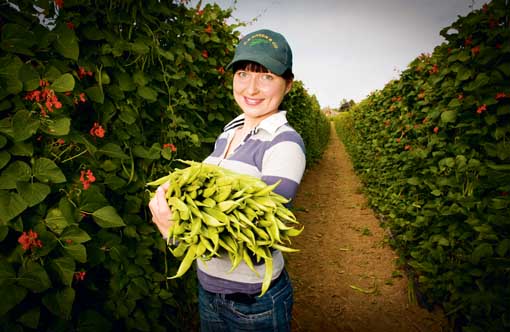FW Awards 2011: Farmworker of the Year finalist – Liliya Kucher

Lilya Kucher
Rook Row Farm, Malvern, Worcestershire
Running any farm is hard work, but there’s probably nothing quite as demanding as growing speciality vegetables for the supermarket trade.
Andrew Green knows all about it. At Rook Row Farm, Mathon near Malvern, his family grows 60ha (150 acres) of runner beans, tenderstem broccoli, mange tout, sugar snap peas and courgettes for the big supermarkets.
The buyers demand high-quality produce, so crops have to be picked with hour-by-hour precision. It’s not a job that many UK workers like doing, so the farm relies on up to 120 workers a year from eastern Europe. That means up to eight different languages are spoken, so supervision of workers has to be of the highest calibre.
“We produce difficult products that need a lot of care,” says Andrew. “The supermarkets are looking for almost perfect products.”
The crops are processed and pre-packed on site and there’s also a flock of 270 breeding ewes that consume the veg packhouse waste. The months of July, August and September, says Andrew, are just plain manic.
It was into this whirlwind of a business that Liliya Kucher stepped five years ago. She had come to the UK from Ukraine through the seasonal agricultural worker scheme (SAWS). Though she had a degree in agricultural economics and her family are farmers, she knew nothing about the UK veg sector.
But behind the ready smile and friendly personality was someone who was determined to get involved in far more than just picking veg. And five years on, she is involved in virtually every aspect of this farm other than negotiating prices with supermarket buyers.
Organising the actual picking is one of toughest jobs on any veg farm. Usually there is a supervisor monitoring each gang all the time, but Liliya’s language skills (she can get by in Bulgarian, Latvian, Lithuanian, Polish, Romanian and Russian, as well as her native Ukrainian) meant she could work closely with the pickers to come up with a more effective way of doing it.
Each picker is responsible for the same area throughout the season, so she is easily able to monitor output from each worker and give them extra training or advice if they’re not doing so well. It’s a vital task that requires considerable diplomacy, says Andrew, and the workers appreciate her fairness and respect the fact that she has spent many years doing the picking too.
Veg crops like these can go from being not-ready on the morning to over-ripe in the afternoon, so she monitors crop progress like a hawk. She then decides which fields will be picked and organises the workers.
She’s increasingly involved in the agronomic side, too, making decisions about when and where crops will be planted and costing out current and new varieties. She does a lot of the cultivation work too as well helping with the lambing, vaccination and worming of the sheep flock.
What of the future? Liliya is currently working towards a managerial and supervisory diploma through training firm Concordia and plans to follow that up with a management and leadership training course.
Liliya is certainly destined to go places in the future, but her current role is providing lots of satisfaction and challenges. Which is good news for Andrew Green.
“If she left tomorrow, we’d have to employ two or three people to replace her,” he says. And there’s no greater compliment than that.
Farm facts
• 150 acres
• Growing speciality veg for supermarkets
• 120 seasonal workers
• 270 breeding ewes
What the judges liked
• Ability to do any job
• Multi-lingual skills a big benefit
• Pickers appreciate her fairness

